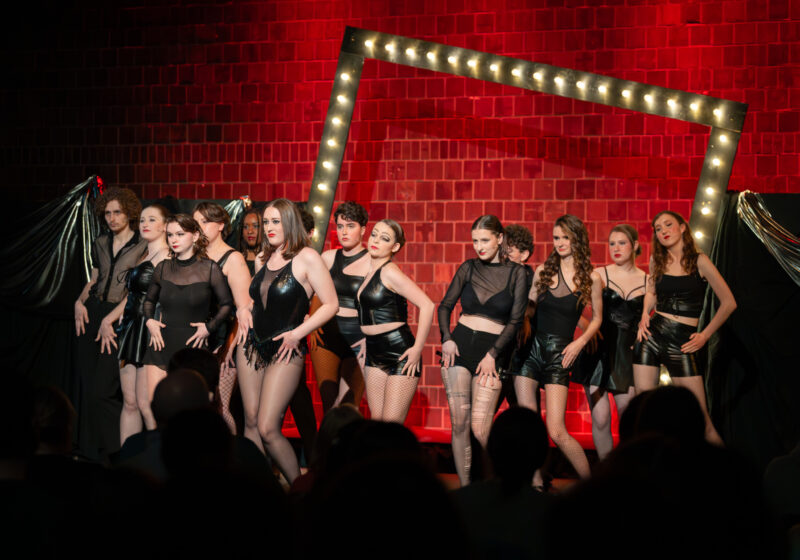Immediately following his audition for “The Daily Show,” Aasif Mandvi was hired by host Jon Stewart to be the “senior Middle East/Muslim/All Things Brown correspondent,” much to the confusion of his parents and himself, as he admittedly spent more time at bars than at mosques. This past Saturday night, Mandvi amused students, parents and alumni with similarly humorous yet insightful stories at the Palestra, reading excerpts from his book, “No Man’s Land,” before a question-and-answer session.
Though Aasif Mandvi is most famous for his role in “The Daily Show,” he is also an award-winning actor, writer, producer and comedian; he has starred in various plays on and off-Broadway, in television series and in movies.
His book, “No Land’s Man,” features vignettes of unique experiences as a Muslim Indian-British-American. Mandvi started reading by animatedly imitating his father’s accent and puzzled reaction to his job offer as, among other things, a senior Muslim correspondent. He warned Mandvi not to disclose any opinion on Islam for fear of humiliating the whole family, unless he calls his mother first.
Mandvi also recalled his own confusion when auditioning for the role. As an Indian-American actor, he was accustomed to auditioning for roles based on stereotypes, such as “cab drivers, deli owners, doctors and terrorists.” His audition for “The Daily Show,” however, did not involve accents, turbans or fake beards. Unsure what Jon Stewart wanted, Mandvi, as one does in such a situation, impersonated Stephen Colbert. To his surprise, Stewart hired him immediately, and he had his first taping for the show just hours later.
Just as he felt out of place during his audition to play a turban-wearing snake charmer, Mandvi—a non-practicing Muslim, by heritage—felt like an imposter when people began to recognize him from “The Daily Show” as the “senior Muslim correspondent”—particularly when Muslims, Indians, Pakistanis and Arabs greeted and thanked him, some of whom even tried to set him up with their daughters.
Though Mandvi felt uncomfortable about receiving gratitude from the American Muslim population, he liked it, if only because there were no representations of American Muslims in media who could criticize America without eliciting accusations of anti-Americanism, or worse, terrorism. He realized, then, that it did not matter that he was not an exemplary Muslim, despite being the senior Muslim correspondent for “The Daily Show.” Mandvi’s role on the show extended beyond himself as an individual; he became a representative for the underrepresented.
As an interview with Associate Provost for Global Engagement Jane Gatewood began, Mandvi showed students a clip from his sitcom parody web series, “Halal in the Family. Through this clip, it became evident that Mandvi is no stranger to using satire and humor to entertain as well as provide social commentary and mental fodder.
Underlying Mandvi’s humorous stories are more serious sociopolitical issues, which Gatewood introduced during the Q&A session when she confronted him with his views of America. Mandvi criticized on the ignorance of Americans to news outside of the United States and their lack of interest in pursuing such information.
Mandvi continued his criticisms of America with the ignored issue of homogeneity in Hollywood. Due to the lack of roles for Indian-Americans, he had to write the roles for himself, which he did with his award-winning one-man show, Sakina’s Restaurant. He further addressed the issue by responding to Matt Damon’s recent controversial statement on Project Greenlight, that diversity is “what you do in the casting of the movie, not the casting of the show [panel],” Mandvi contends this fallacy, insightfully elaborating on the reflexive process through which people determine what is considered “good.” He explains: when Damon considers someone’s acting as “good”, it is because he is “responding to the thing that reflects him back to himself, which is the narrative of a white man.” Subsequently, “the narrative of a brown person or a woman” becomes categorized as “other” as opposed to “good”; therefore, diversity is necessary behind the camera in order for diverse decisions to exist.
During the Q&A with the audience, students appreciated his thorough commentary on diversity, and it was a recurring topic of discussion. Akanksha Varma, Class of 2016, said, “I thought it was enlightening to have him talk about the reception of South Asian culture in America and what kind of biases exist in the society against people of color in Hollywood.”
After the evening with Aasif Mandvi, Emri Stenn, Class of 2019, commended how Mandvi skillfully navigates through various topics, from being on The Daily Show to issues of diversity. “It was amazing how he was able to use humor to address political issues involving Muslims and how it is like to be an Indian growing up in the United States.”
Imploring Rochester students to rethink their thoughts and actions with satirical and humorous prose, Akanksha Varma, Class of 2016, thought Mandvi made this year’s Meliora Weekend not only entertaining, but one which shines a light on current issues plaguing American society. This Meliora Weekend “show[ed] how diverse the UR community really is, when people from such diverse backgrounds are called upon performers for a signature event.”
Kim is a member of the class of 2017.





